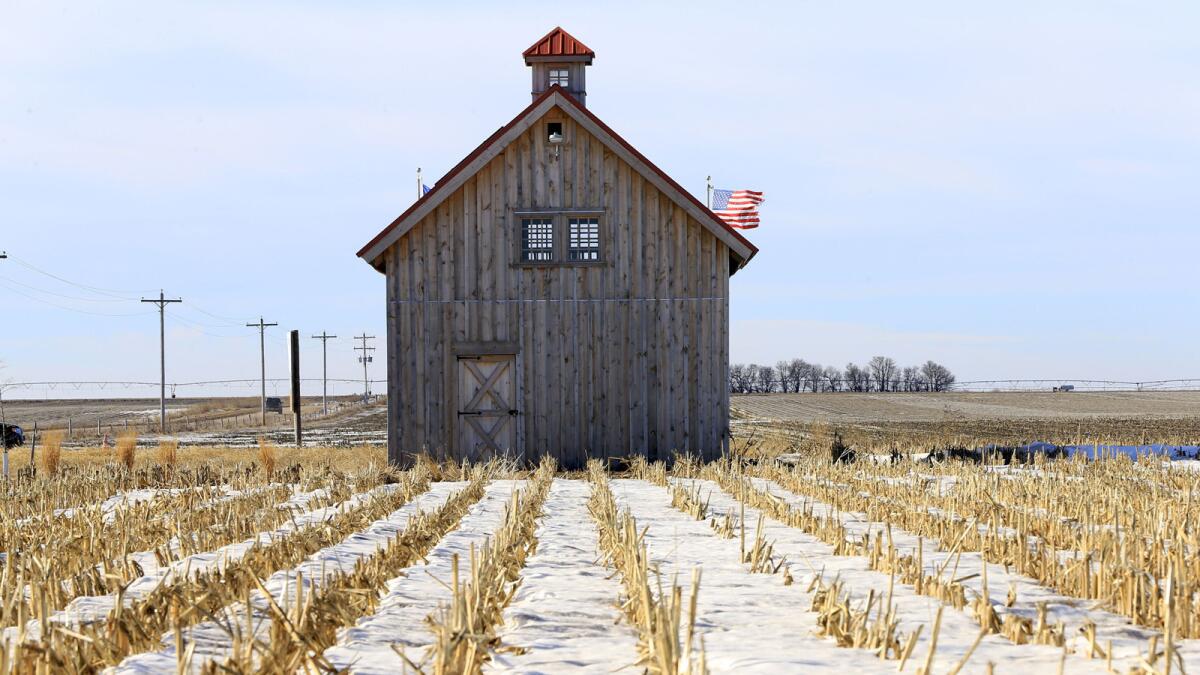New twist in Keystone controversy: Pipeline owner TransCanada asks for a delay

Opponents of the Keystone XL pipeline built this barn in the pipeline’s path near Bradshaw, Neb.
The company that hopes to build the Keystone XL pipeline to carry crude oil from Canada to the Gulf Coast asked the Obama administration Monday to delay its review of the proposal — a striking turn that adds further uncertainty to a project that has generated bitter debate since it was proposed seven years ago.
The company, TransCanada, made its request in a three-paragraph letter to Secretary of State John F. Kerry, citing legal challenges it said had prompted it to change tactics. The State Department must review the project because it would cross an international border. President Obama had said that he would make the final decision.
“TransCanada believes that it would be appropriate at this time for the State Department to pause in its review of the presidential permit application for Keystone XL,” the company wrote.
Spokesman Mark Cooper said TransCanada was not withdrawing its application. Instead, he said, “We are asking the State Department to suspend a decision.”
A State Department official said the agency was reviewing the request.
The move by TransCanada appeared to confirm speculation that the company hopes to push off a decision until the next administration because it fears Obama will reject the pipeline. Hours before TransCanada announced its request, the White House said it expected Obama to make a decision about the pipeline “before the end of his administration,” though it did not specify when.
The request also reflects a remarkable turnabout by TransCanada, which has spent years complaining of delays in the process only now to request one itself.
Last month, after meeting stiff legal resistance from landowners in Nebraska, the company decided to withdraw its plans to use a special state law that would allow it to exercise eminent domain to seize land for its preferred pipeline route. The company instead applied for a permit through the Nebraska Public Service Commission, a process that could take a year.
The company referred to those events in its letter to Kerry, in effect claiming that the legal opposition to how TransCanada was operating in Nebraska should prevent a federal decision on the pipeline in general that could go against it. It said a previous legal challenge to the project last year had caused uncertainty that prompted the State Department to temporarily suspend its review.
“We submit that, in the current circumstances, a similar suspension of the review process would be appropriate,” the company wrote. “In order to allow time for certainty regarding the Nebraska route, TransCanada requests that the State Department pause in its review of the Presidential Permit application for Keystone XL.”
The pipeline would carry more than 800,000 barrels of crude oil a day from the tar sands of Alberta, Canada, across the U.S. border south to Gulf Coast refineries. Supporters say the project would boost jobs and contribute to energy security. Environmentalists contend it would increase emission of greenhouse gases.
The price of oil has plummeted dramatically since the pipeline was proposed, and the oil industry has pulled back from many large projects. Royal Dutch Shell recently announced it would abandon its effort to drill for oil in the Arctic Ocean “for the foreseeable future.”
Even as TransCanada requested a delay, opponents of the project urged the administration to reject the project anyway.
“Today, tomorrow or next year, the answer will be the same: Keystone XL is a bad deal for America, our climate, and our economy,” Tom Steyer, the billionaire environmental activist and Democratic donor, said in a statement Monday. “Secretary Kerry should reject TransCanada’s request for delay, and President Obama should immediately reject the Keystone XL pipeline once and for all.”
Obama has long argued that he would judge the pipeline based on whether it accelerates the effects of climate change, and secondarily on whether it would significantly affect how much Americans pay for energy.
“We’re not going to authorize a pipeline that benefits largely a foreign company if it can’t be shown that it is safe and if it can’t be shown that overall it would not contribute to climate change,” he said at a town hall meeting this year.
A top official in the Environmental Protection Agency told the State Department in a letter this year that tar sands crude “represents a significant increase in greenhouse gas emissions” over conventional crude, and that Keystone XL could lead to expanded production of greenhouse gases. The letter was seen as providing potential cover for the president to reject the pipeline.
Opponents of the project have been increasingly confident that the president would ultimately reject it, but Obama has suggested that its political boosters and to some degree its detractors have overstated its potential effects.
“I’ve just tried to give this perspective,” he told reporters in December.
Although TransCanada’s request may free Obama from a politically thorny decision, the issue is not likely to go away for candidates in the 2016 presidential race.
Keystone XL long ago evolved into shorthand among conservatives as an example of liberal overreach. Some Republicans have cited the Obama administration’s long-simmering decision-making on the pipeline as an example of how it stifled potential job-creating projects to advance its environmental agenda.
While Republican presidential contenders have expressed support for Keystone XL, Democratic candidates have argued against it.
Hillary Rodham Clinton announced in September that she would oppose the project after months of silence on an issue she had confronted during her time as secretary of State.
“It is imperative that we look at the Keystone pipeline for what I believe it is: a distraction from the important work we have to do to combat climate change and, unfortunately from my perspective, one that interferes with our ability to move forward,” she told voters in Iowa.
Her main rival for the Democratic nomination, Sen. Bernie Sanders of Vermont, also opposes Keystone.
Credo Action, a liberal activist group, called TransCanada’s request Monday a “desperate” attempt to prevent Obama from blocking the project altogether.
“This is President Obama’s decision, and he shouldn’t cave to a foreign oil company trying to twist his arm into punting it to future presidents,” Elijah Zarlin, Credo’s climate campaign director, said in a statement.
But Sen. Heidi Heitkamp, a North Dakota Democrat who supports the project, expressed frustration at how Keystone had been conflated “into the foremost emotional and overly politicized issue.”
“Halting a basic infrastructure expansion project will not make this country more energy efficient or independent, but it does set a foreboding precedent about our ability to achieve those goals,” she said.
Yardley reported from Seattle and Memoli from Washington. Times staff writer Paul Richter in Washington contributed to this report.
ALSO
Should U.S. tolerate foreign dictators? Issue splits Republican candidates
Super volcano? The Big One in Wyoming? A huge gash in Earth has folks talking
How evolving public attitudes on marijuana could affect the 2016 presidential race
More to Read
Sign up for Essential California
The most important California stories and recommendations in your inbox every morning.
You may occasionally receive promotional content from the Los Angeles Times.












